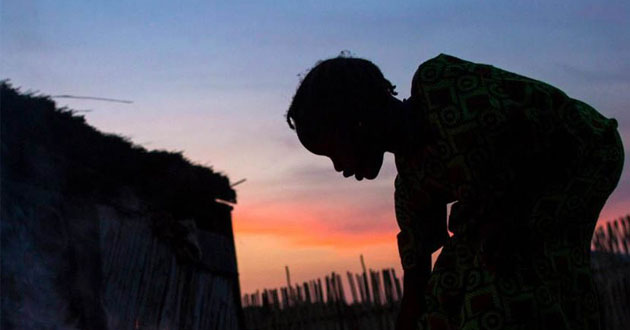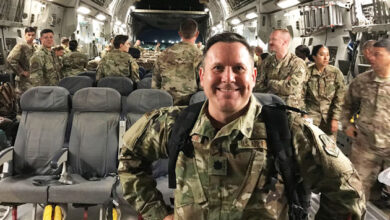Angry, tortured refugee makes peace with God’s love

BULGARIA — Andrew* limped up the stairs to the pulpit of the church. As he turned to face the congregation, I noticed that one of his eyes sagged. The scarring was evidence of the torture he had endured.
He greeted the members of the Bulgarian Baptist church in broken English. It was the late 1990s and it had been less than a decade since the Soviet Union had dissolved. Many of the believers sitting shoulder to shoulder in the pews of the church had known the trauma of persecution under the communist regime. Some had been imprisoned. They were acquainted with suffering, so they could relate to Andrew’s story in a way that I couldn’t.
Standing in front of a congregation of Bulgarian believers, Andrew described how fighters had come to his village and executed his father in front of his eyes. He held his dad as he died in his arms.
Then the men dragged Andrew to prison where they tortured him. They beat him so badly that they destroyed the vision in one of his eyes. Searing jolts from electric shock permanently damaged the nerves in one of his legs.
A priest who visited the prison on occasion helped him escape. Then his long walk over the North African desert began. He traveled on foot to the shores of the Mediterranean Sea. It’s a miracle he survived the brutal journey.
From Egypt he crossed into Israel, where he registered as a refugee and applied for asylum in Europe. Bulgaria offered to take him. An African who had never seen snow, he was totally unprepared for winter in the Balkans. He shivered almost constantly, never really managing to feel warm. But his heart was burning with anger. He was consumed with the desire to take revenge on the men who destroyed his life.
From hate to love
Andrew and some refugee friends began attending services at a church, attracted by a promise of free meals. James, the pastor and a former car mechanic from Texas, and his wife Audrey served a meal in their apartment after the service every Sunday. They invited anyone who wanted to come.
No one could resist Audrey’s buttery casseroles — not me and not the African refugees. I met Andrew when I sat across from him at the kitchen table. He asked me about my family. Did I have brothers, sisters and aunties? He wondered how my father felt about me being so far from home. Was he worried that I lived alone? I sensed the cultural distance. This man from a closely knit tribal society hardly knew what to make of a young woman traveling voluntarily across an ocean to make a life of her own, far from those who were her protectors.
One Sunday, Pastor James happened to be preaching on the Sermon on the Mount. He emphasized Jesus’ command to love your enemies. Jesus’ teaching struck Andrew as ridiculous and offensive. So he confronted James after the service, planning to argue. He felt only hatred for his enemies. He wanted retribution, not love.
But over months of conversations, James patiently explained the power of the Gospel. The Sermon on the Mount convicted Andrew. Jesus’ teaching, death and resurrection broke through his bitterness. He decided to follow Jesus, knowing that this new commitment meant he had to forgive the men who killed his father.
Standing in the pulpit of the Bulgarian church, he said he wanted to return to North Africa, the place of his greatest sorrow. Before, he wanted to go back to kill his enemies, but now he would forgive them. God’s love, he believed, could save them, just as it had transformed him.
Listening to Andrew, I wondered if I would do the same. Would God’s love flow through me if I watched my father die in my arms? Would I be able to love people if they tortured me the way they tortured Andrew?
Andrew’s testimony taught me three things about God’s love:
- Jesus isn’t asking us to do something He hasn’t already done Himself.
He forgave those who crucified Him. He loved us while we were still enemies of God (Romans 5:10). Jesus calls Christians to love our enemies and bless those who curse us, because He did the same. He established a pattern for those who would follow after Him (1 Peter 2:20–25).
- Loving our enemies isn’t something we do for God. It’s something God does through us.
This sort of love isn’t natural; it’s supernatural. It isn’t a love any person can muster in his own strength. This love is the fruit of the Spirit, at work in those who believe. It can’t be manufactured; it can only be gifted. If we suffer in Jesus’s name without retaliating, the “Spirit of glory and of God” rests on us (1 Peter 4:12–19).
- Jesus’s command to love our enemies applies to all Christians, everywhere, all the time.
Andrew understood that he couldn’t be a follower of Jesus and not submit to this hard teaching. The call to love even our enemies subversively breaks the natural cycle of violence that has corrupted God’s good world. It is this love that most closely reflects the merciful character of God Himself (Luke 6:27–36).
Commenting on Jesus’s teaching in the Sermon on the Mount, Charles Spurgeon realized that loving enemies is one of the most distinctive aspects of the Christian discipleship:
“We do not merely cease to hate and then abide in a cold neutrality, but we love where hatred seems inevitable. We bless where our old nature bids us to curse, and we are active in doing good to those who deserve to receive evil from us…. He who can bless the unthankful and the evil is a child of God, for the Lord is doing this on a great scale in daily providence, and none but his children will imitate him.”
Will I love like Christ? Will I imitate Him in blessing even my enemies? A North African refugee taught me that if I’m a follower of Jesus, I don’t have a choice. Andrew showed me the radical love of God that embraces even our enemies. Recently, I spoke with James and Audrey. They told me that Andrew returned to North Africa to put this love into practice.
*Name changed.
— by Eliza Thomas | BP




